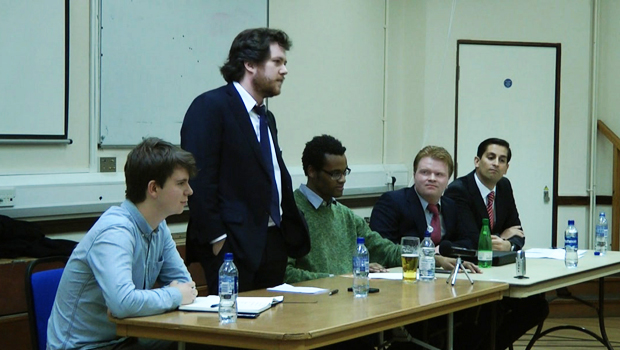The touch point for the event on Jan. 12 was the infamous appearance of Alessio Rastani, a market trader and self-proclaimed financial self-help guru, on BBC News in which he proclaimed exactly that — his brutal critique of the domination of the world by the investment managers eliciting shock from the BBC anchors.
In favor of the proposal were Rastani himself and Sean Donen, an aspiring Liberal Democrat campaigner. On the opposing side were Brian Carney, a writer for the Wall Street Journal and self-confessed libertarian and an Oxford art student, Joe Bates.
Donen started the debate off supporting the proposition. “Sometimes we wrongly assume that politics is synonymous with power. Not only is that not true, it’s becoming less true every day, and in the post-financial crisis world where politicians more and more want big business, they’re becoming more enslaved by investment banks.”
The obvious points of reference were brought up — he mentioned the fact that Italian Prime Minister Mario Monti, a former employee of Goldman Sachs, is literally running Italy.
He could also have mentioned Greece Prime Minister Lucas Papademos and ECB President Mario Draghi, who are both former Goldman Sachs employees.
The European technocrats are the most transparent example of Goldman Sachs’ influence.
“Not only do Goldman Sachs sit on Treasury Select Committees across the world, a third of the American select committee entirely come from people at Goldman Sachs.”
Carney was next, dismissing the argument as conspiracy theory.
“Sometimes a big lie, as everybody knows, becomes so big that it almost becomes tantalizing to believe it, and I think that’s what we have here today.”
Although he avoided the outright libertarian monologue he had threatened near the beginning, his tract was decidedly anti-state, decrying state-sponsored violence and enforced taxation as the genuine point of agitation in the modern world economy.
“You know who runs the world? It’s not the guys at Goldman Sachs, it’s not the guys at Wall Street, it’s not the guys at Canary Wharf — it’s the guys with guns! And the guys who have guns are the government.”
Then came Rastani, who posited a more extreme view of the world’s financial underbelly. Unlike Donen — who, by his very nature was in defense of the parliamentary process — Rastani’s proposal verged on an apocalyptic vision, dismissing all contemporary politicians.
“When President Obama came to power he promised change. What he actually brought was business as usual.”
He referenced Goldman Sachs’ bankrolling of Obama’s campaign as another example of the company’s insidious reach.
The name of Ron Paul was invoked more than once — shouted by audience members in riposte to Rastani’s dismissal of the Republican candidacy nominations, to which he acquiesced a, perhaps grudging, respect for the GOP hard-liner.
Occasionally, he bordered on conspiracy theory — bringing up the assassination of JFK (Kennedy) as the work of bankers did raise a few eyebrows — but his railing against fiat currency and suggesting a return to the gold standard is well in line with many financial commentators today; many have predicted the US to return to the standard within as little as five years.
“People believe in a democracy. We need to believe that and the media of course keeps telling us that...the media and the financial institutions want us to believe the world is democratic and the people we elect are there to represent us. I think most of us here know better.”
Finally, Bates, a self-confessed art student “layman” took, like Carney, the conspiracy theory line.
“Conspiracy theories are the ultimate fairy tales, because rather than giving you a good guy to believe in, they give you the big bad wolf. They tell you who’s to blame and allow to no longer take responsibility for stuff that’s happening in the real world.”
He tried to place the Goldman Sachs theory in terms of a sociological reaction — people who feel scared and powerless trying to make sense of complex events through picking up on strands running between them. He also decried the tendency to focus on the banking sector and ignore the power and influence of other nonfinancial sector corporations.
Perhaps it’s better not to think of the likes of Goldman Sachs as a group of actual Machiavellian individuals with an Illuminati-style desire to run the world behind the scenes. Perhaps instead it is better to think of the entire investment banking market, with all of its CDOs (collateralized debt obligations), CDSs (credit default swaps) and other terribly complicated derivatives and futures, as something of a “mad power,” with governments across the world in thrall to its irrational whims and fluctuations.
Whether you believe that Goldman Sachs actually does run the world or not, no-one can argue that the fates of the global economy are critically tied in with the fates of the banks — they may rule the world without even realizing it. In some ways, that’s actually a scarier thought...










